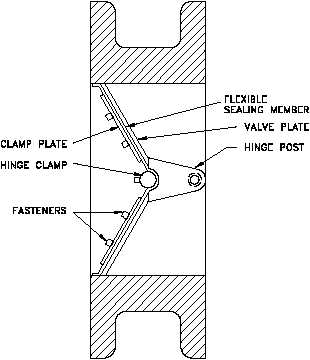Valves
DOE-HDBK-1018/2-93
TYPES OF VALVES
Butterfly Check Valves
Figure 26 Butterfly Check Valve
Butterfly check valves have a seating
arrangement similar to the seating
arrangement of butterfly valves. Flow
characteristics through these check valves
are similar to the flow characteristics
through butterfly valves. Consequently,
butterfly check valves are quite frequently
used in systems using butterfly valves.
In addition, the construction of the
butterfly check valve body is such that
ample space is provided for unobstructed
movement of the butterfly valve disk
within the check valve body without the
necessity of installing spacers.
The butterfly check valve design is based
on a flexible sealing member against the
bore of the valve body at an angle of 45o.
The short distance the disk must move
from full open to full closed inhibits the
"slamming" action found in some other
types of check valves.
Figure 26
illustrates the internal assembly of the butterfly check valve.
Because the flow characteristics are similar to the flow characteristics of butterfly valves,
applications of these valves are much the same. Also, because of their relatively quiet operation
they find application in heating, ventilation, and air conditioning systems. Simplicity of design
also permits their construction in large diameters - up to 72 inches.
As with butterfly valves, the basic body design lends itself to the installation of seat liners
constructed of many materials. This permits the construction of a corrosion-resistant valve at
less expense than would be encountered if it were necessary to construct the entire body of the
higher alloy or more expensive metal. This is particularly true in constructions such as those
of titanium.
Flexible sealing members are available in Buna-N, Neoprene, Nordel, Hypalon, Viton, Tyon,
Urethane, Butyl, Silicone, and TFE as standard, with other materials available on special order.
The valve body essentially is a length of pipe that is fitted with flanges or has threaded, grooved,
or plain ends. The interior is bored to a fine finish. The flanged end units can have liners of
various metals or plastics installed depending upon the service requirements. Internals and
fasteners are always of the same material as the liner.
Rev. 0
ME-04
Page 39


